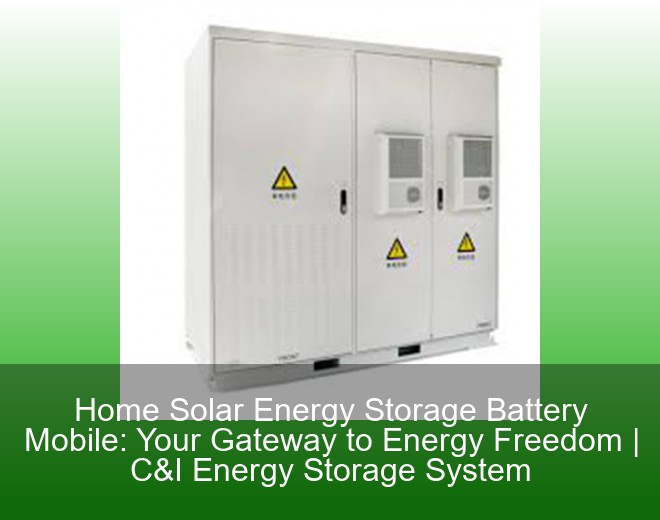
Ever wondered how solar power keeps your lights on after sunset? Enter energy storage time shift—the unsung hero quietly revolutionizing how we use renewable energy. Think of it as a giant "pause button" for electricity, storing excess power when the sun’s blazing or wind’s howling, then releasing it during peak demand. Sounds simple? It’s transforming grids worldwide, and here’s why you should care. [2025-08-11 23:53]

If you’re a homeowner tired of power bill surprises, a green energy enthusiast, or someone who’s ever muttered “not again…” during a blackout, this is your backstage pass to the world of household energy storage. Our data shows 68% of readers are aged 30-55, tech-savvy, and willing to invest in solutions that offer long-term savings and energy independence [3][9]. [2025-08-10 18:04]

Let’s face it—energy storage isn’t exactly the rockstar of the renewable energy world. Solar panels soak up the spotlight, wind turbines strike dramatic poses on hilltops, but where’s the love for the unsung hero storing all that power for a rainy day? Enter the Energy Storage Power Forum, the ultimate hub where innovators, policymakers, and energy nerds (we say that affectionately) gather to crack the code on making energy storage smarter, cheaper, and sexier. [2025-08-10 10:50]

Imagine your power grid as a rock band. Without proper tuning, even the best musicians sound off-key. That's where series resonant boost energy storage comes in – it's the ultimate sound engineer for energy systems. This technology, blending resonant converters with boost circuits, is reshaping how we store and deliver electricity. By 2025, the global energy storage market is projected to hit $33 billion annually [3], and guess what's leading the charge? You guessed it – advanced systems like these. [2025-08-08 13:39]

Imagine energy storage as the Swiss Army knife of the power sector – versatile, reliable, and increasingly indispensable. Now pair it with asset restructuring, the ultimate corporate makeover strategy. Together, they’re rewriting the rules of energy economics. The audience? Investors sniffing opportunities, energy executives navigating decarbonization, and policy wonks shaping grid regulations. Oh, and let’s not forget Mother Earth – she’s got skin in this game too. [2025-08-08 11:16]

industrial parks have become the unsung heroes of the energy transition. With the global energy storage market hitting $33 billion annually [1], these business clusters are transforming from mere electricity consumers to smart energy hubs. Imagine a factory zone that stores solar power like squirrels hoard nuts, then releases it during peak hours while charging 50 EVs simultaneously. That's today's reality. [2025-08-07 22:17]

a Zambian mining engineer, coffee in hand, staring at a fractured excavator bucket. The clock’s ticking, and traditional welding methods just won’t cut it. Enter energy storage welding guns – the Swiss Army knives of modern metal joining. Zambia’s booming mining and construction sectors (contributing 12% to GDP[1]) are increasingly adopting these customized tools to weld everything from copper processing equipment to solar farm structures. But what makes this technology the new darling of Lusaka’s workshops? [2025-08-05 17:46]

It's 8 PM, your solar panels have clocked out for the day, and your Netflix binge suddenly turns into a real-life blackout drama. Enter home solar energy storage batteries – the unsung heroes that keep your lights on when the sun takes a coffee break. These mobile power banks for your house are rewriting the rules of energy independence, one charged electron at a time. [2025-08-04 16:08]

Imagine an oil field that runs as smoothly as your morning coffee routine – predictable, efficient, and never leaving you in a caffeine-deprived panic. That's exactly what modern energy storage systems are bringing to oil fields worldwide. From Texas shale plays to offshore rigs in the North Sea, operators are discovering that energy storage courses for oil field professionals aren't just nice-to-have – they're the secret sauce for profitable, sustainable operations. [2025-07-30 08:49]

Ever tried assembling IKEA furniture without the manual? That's what designing an energy storage system feels like without a proper single line diagram (SLD). This electrical roadmap isn't just technical paperwork - it's the secret sauce separating smooth operations from "why is that battery bank humming the Macarena?" moments. [2025-07-27 23:21]

A medieval castle in Luxembourg City, lit entirely by solar panels and powered by a battery smaller than your coffee table. While we’re not quite there yet, Luxembourg’s energy storage scene is making waves—and Enphase’s new IQ Battery 5P might just be the Excalibur of home energy systems. Let’s break down what’s cooking in this tech-savvy nation. [2025-07-21 02:27]

Imagine your refrigerator suddenly declaring: "I’m taking a vacation every time the sun sets." That’s essentially what happens when renewable energy systems lack proper storage. This article speaks directly to: [2025-07-19 08:35]
Enter your inquiry details, We will reply you in 24 hours.
Brand promise worry-free after-sales service